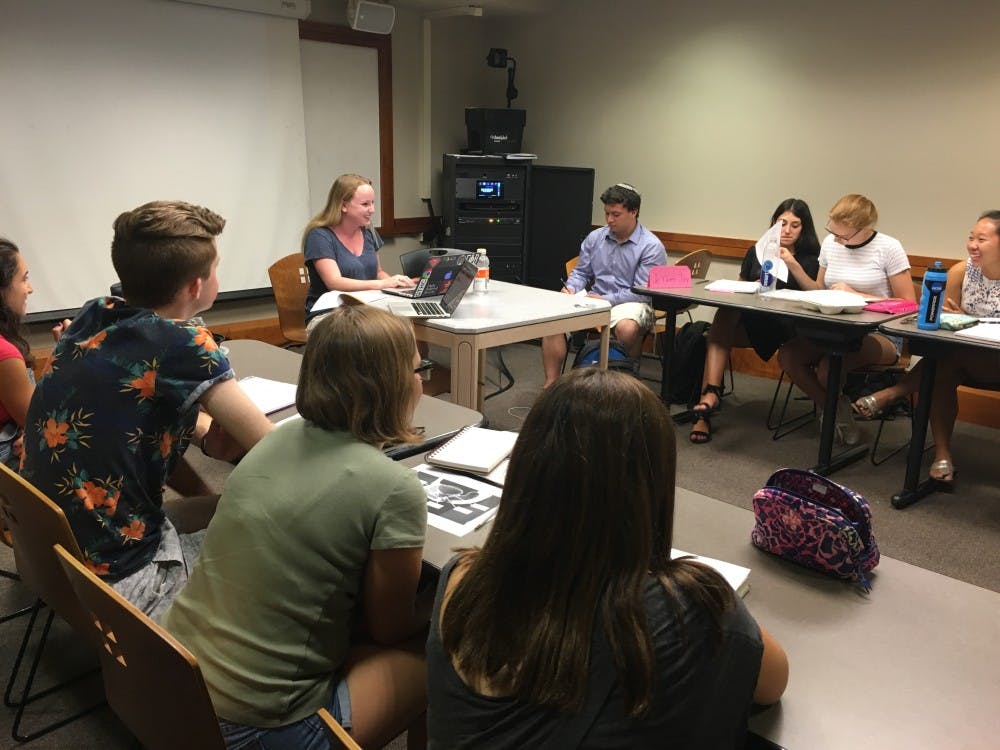If you have ever fallen asleep over biology notes in Perkins, dreaming that you could take a class on Harry Potter or "The West Wing" instead, house courses at Duke could make that a reality.
Presenting an opportunity unlike any other at Duke, house courses allow students to explore ideas that pique their interest within the setting of a residence hall. Taught by undergraduates or faculty members, the courses allow students to pursue their interests in an specific arena, addressing topics that might not be otherwise focused on. Topics vary greatly and include ethics, sexual health, international relations, the intersections of media and religion and basic introductions into subject matters.
“The house course is my way of telling things, sharing ideas and things that I think matter," said junior John Lu, who teaches a course entitled "Neglected Tropical Diseases."
Each course is worth a half-credit and is supervised by a Trinity faculty member teaching on campus during the semester during which the course is offered. The pass/fail courses require no prerequisites and meet for a minimum of 18 hours per semester.
Lu explains that house courses are an integral part of the “canon of knowledge” that allows Duke students to become as global citizens when they graduate.
Having developed an interest in the topic through independent exploration, Lu said that he considers it his responsibility to disperse knowledge originally introduced to him by professors to help create a better society.
Junior Whitney Hazard, who teaches "Condoms and Counseling," a house course on sexual health, echoed Lu's words about the importance of spreading ideas to improve society.
“I think that sexual health is just not talked about as much on Duke's campus as it needs to be," she said.
In "Condoms and Counseling," Hazard said that the instructors train students to staff the new Peer Advocacy for Sexual Health Center and collaborate with various offices around campus, such as the Women's Center.
"They'll be knowledgeable and be able to help [students] with whatever they need and send them in the right direction,” she said.
Hazard noted that the material she covers in her course is crucial in order to tackle the inadequate sexual education many Duke students received in middle school and high school.
This semester, 16 house courses are being taught, including "Harry Potter and Christian Thought," "Good Eats: Food, Biochemistry and the Science of What We Eat" and "American Foreign Policy through 'The West Wing.'" "Introduction to Financial Markets, Investing and Valuation" currently has 68 students enrolled, the most out of any house course. To get involved with teaching a house course, undergraduate students must seek an instructor to serve as faculty sponsor, as well as undergo an application process.
House courses are generally structured like full-credit classes. Hazard explained that she and her fellow instructors address a different topic about sexual health every week, combining lectures, videos, interactive activities and talks by guest speakers to cover the curriculum.
Lu's course is structured around 18 total diseases and highlights each by discussions based on background reading, providing a broad survey of the diseases and their biological, social and anthropological implications.
Junior Sharon Peng, who took a house course during her freshman year on medical innovation and the pharmaceutical industry, noted that she valued the experience.
“I think house courses are a great way to learn about the things you’re interested in, not as much in a casual setting, but on a deeper level in a setting more focused on participation,” she said.
Peng added that her house course provided her with balance during her Fall semester, allowing her to participate in a style of class unlike the large introductory lectures she was enrolled in.
"It was a really good look into pharmaceuticals on a more intimate level with students who were studying the same thing," she said.
Get The Chronicle straight to your inbox
Signup for our weekly newsletter. Cancel at any time.

